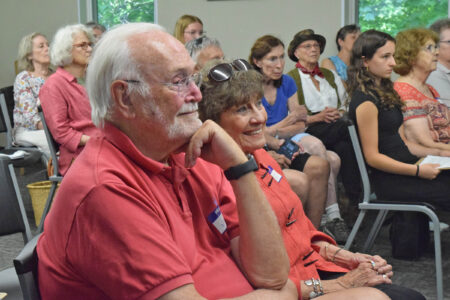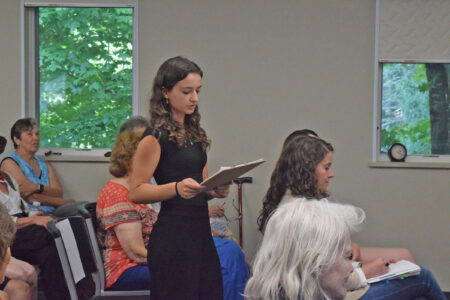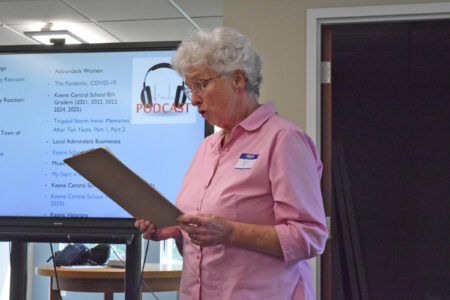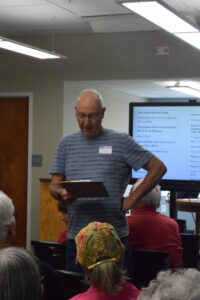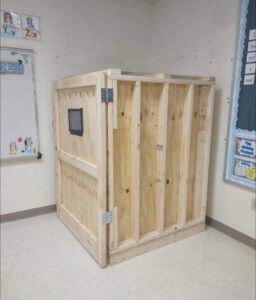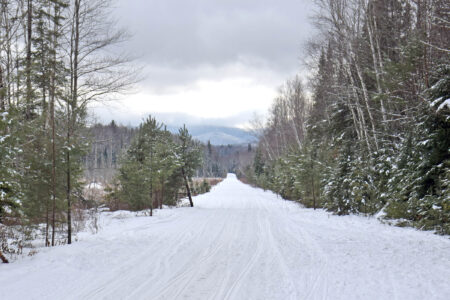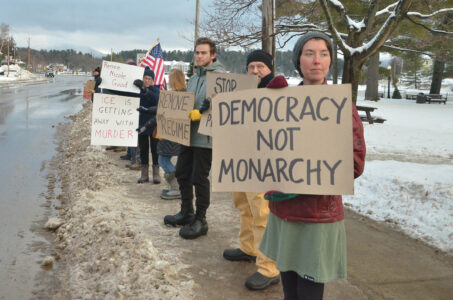400 stories, and counting
Keene Valley celebrates oral history project
- Jim and Charity Marlatt listen to a recording of Charity’s story about her father, Olympic bobsledder Alan Washbond, during a celebration of the Adirondack Community oral history project at Keene Valley Library on Saturday. Charity’s story was the first of 400 stories that have been collected from Keene area residents since 2019. (Enterprise photo — Grace McIntyre)
- Zarela Gulli reads excerpts from the 400 stories that have been recorded and collected from Keene area residents as a part of the Adirondack Community oral history project. (Enterprise photo — Grace McIntyre)
- Ann Sayers reads excerpts from the stories. (Enterprise photo — Grace McIntyre)
- Kirk Ruebenson reads excerpts from the stories. (Enterprise photo — Grace McIntyre)
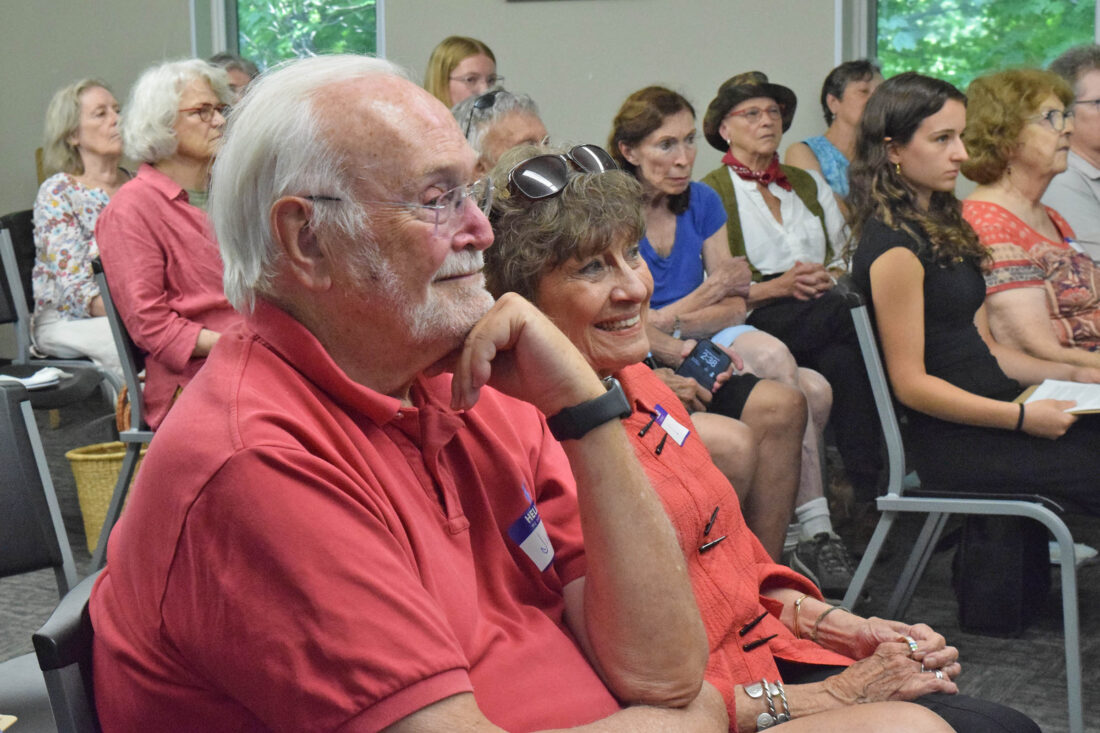
Jim and Charity Marlatt listen to a recording of Charity’s story about her father, Olympic bobsledder Alan Washbond, during a celebration of the Adirondack Community oral history project at Keene Valley Library on Saturday. Charity’s story was the first of 400 stories that have been collected from Keene area residents since 2019. (Enterprise photo — Grace McIntyre)
KEENE VALLEY — Through isolating coronavirus pandemic years and funding challenges, the Keene Valley oral history project — Adirondack Community — has gathered 400 stories toward its goal of helping members of the community learn about their neighbors and history.
This landmark was the cause for celebration at an event on Saturday at Keene Valley Library, where dozens of residents and former residents gathered to hear some of their favorite stories and to learn about what’s next for the project.
Jery Huntley, volunteer and creator of Adirondack Community, said the effort began with a couple of volunteers listening to stories in the library basement with a Chromebook and earphones in 2019. The effort has exploded, spawning numerous other similar projects around the country through the parent organization that Huntley also founded, called OurStoryBridge.
However, Saturday’s celebration was focused on a variety of stories that have sprung from Keene residents, ranging from the inspiring to the unexpected. A handful of volunteers read portions of the stories out loud throughout the event.
There’s the story of Donna Reed Austin, who worked for two decades as both town and county tax collector. Her story is aptly named, “Sworn in and sworn at.”
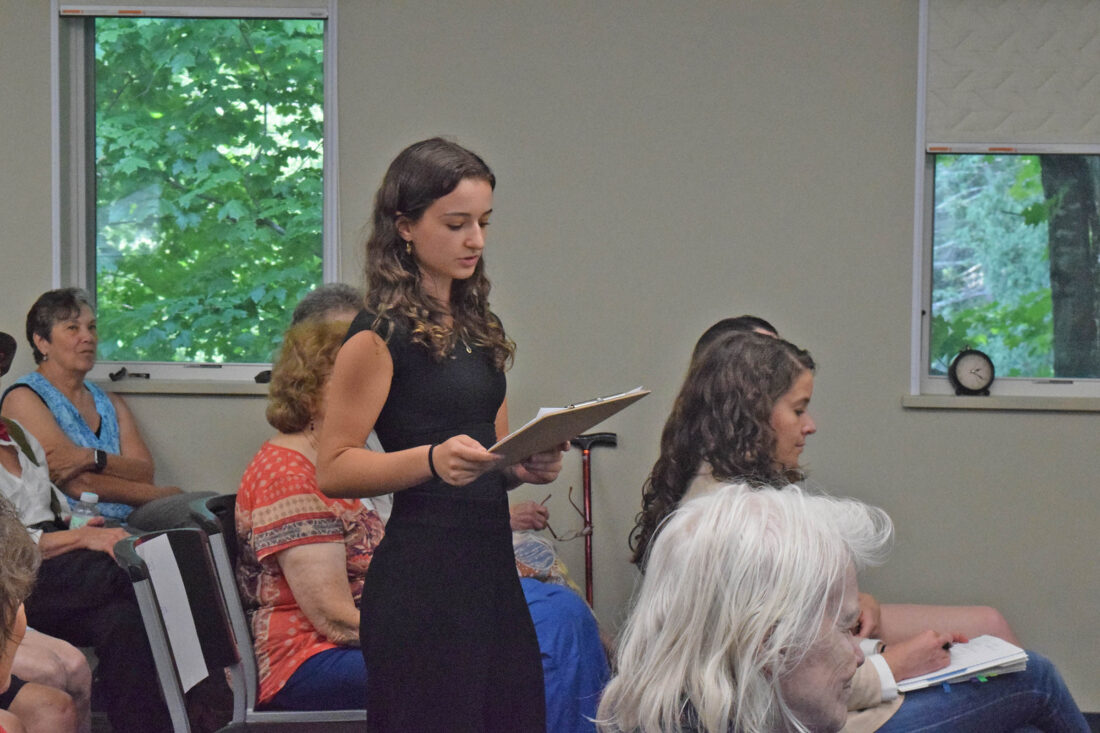
Zarela Gulli reads excerpts from the 400 stories that have been recorded and collected from Keene area residents as a part of the Adirondack Community oral history project. (Enterprise photo — Grace McIntyre)
There’s one about the Women’s Climb, when a group in 1996 decided to hike Mount Haystack in historical clothing to experience what it would have been like for their 19th-century counterparts to climb mountains in less-than-ideal apparel.
There were stories of floods and fires, and the tales behind local landmarks.
When the project was launched, Huntley and her fellow volunteers at the library and around the community had two goals. One was to capture memories before they disappeared completely, and the other was to get students involved in listening to and telling stories of their own.
“What we learned right away is that people, young and old, they don’t know who lives here,” Huntley said. “They don’t know who’s lived here in the past. They don’t know who’s visited — and now they do.”
Charity Marlatt, who traveled from California for this weekend’s event, was the first person to share her story with Huntley. She told the story of her father, Alan Washbond, a Keene Valley native who competed in bobsled at the 1936 Olympic Winter Games in Garmisch-Partenkirchen, Germany. At the time, Adolf Hitler was in power in Germany and many people questioned whether American athletes should even go to the Games. They decided to compete, but not without making their principles known during the Parade of Nations.
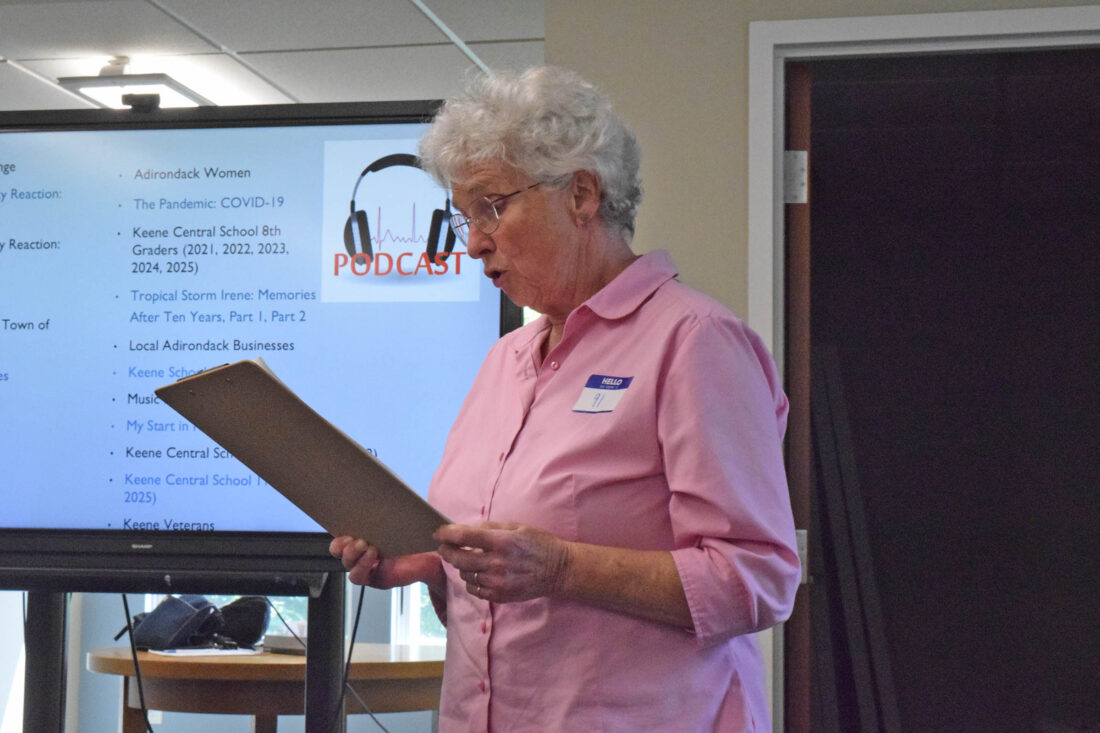
Ann Sayers reads excerpts from the stories. (Enterprise photo — Grace McIntyre)
“All of the participants from the U.S. were determined that the flag would not be dipped in honor of this tyrant, Adolf Hitler,” Marlatt said in her recorded story. “My dad would tell with great pride that that never happened, they never dipped their flag and they never looked his way, either.”
Now, Adirondack Community is one thing that keeps Marlatt connected to her home, which she misses enormously.
“It has been a beautiful addition to our community,” she said. “If you don’t tell these stories, they just go into oblivion.”
Huntley gives Marlatt credit for encouraging others in the area to share their stories. Now, more than 11,000 people around the world have listened to the tales of a town with about 1,100 residents.
And as a result of Huntley’s work to train and provide resources to museums, libraries and other organizations, 42 similar oral history projects now exist in 16 states and territories. To listen to these stories, visit myadirondackstory.org and ourstorybridge.org.
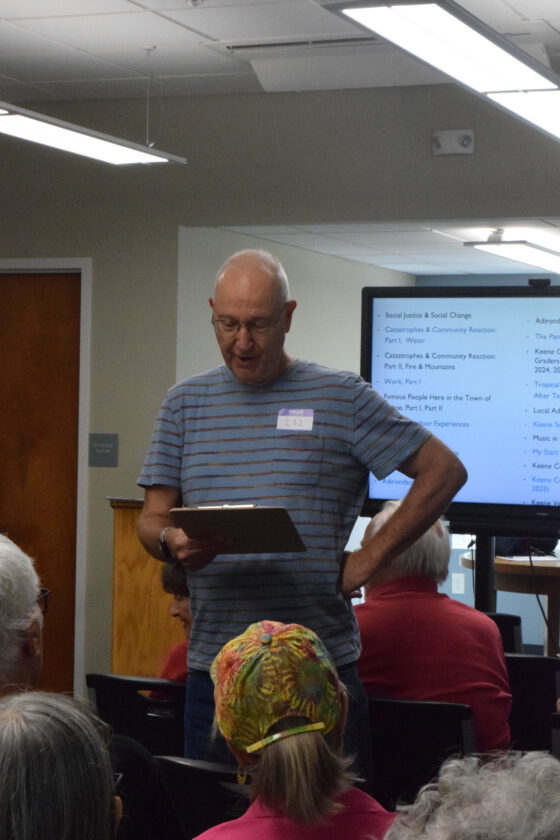
Kirk Ruebenson reads excerpts from the stories. (Enterprise photo — Grace McIntyre)
–
The story continues
–
Every story has its plot twists and crises.
Earlier this year, OurStoryBridge started to gain traction at a national level and was attracting the attention of federal agencies — the National Endowment for the Humanities, the National Endowment for the Arts, the Institute for Museum and Library Service and the National Park Service — that have historically supported this kind of historical and cultural work.
In March, the door to federal funding seemed to have opened to OurStoryBridge when the organization received its first direct federal grant of $35,000 from the NEH. The purpose of the grant was to research and create a strategic plan for using the stories in public educational programming, including in schools.
Three weeks later, that grant was rescinded.
“NEH has reasonable cause to terminate your grant in light of the fact that the NEH is repurposing its funding allocations in a new direction in furtherance of the President’s agenda,” the letter said. “Your grant’s immediate termination is necessary to safeguard the interests of the federal government, including its fiscal priorities.”
Now, grants from the four agencies that could have provided funding to expand the projects — and allow OurStoryBridge to hire a staff member to take over Huntley’s volunteer work — seem to be all but off the table, Huntley said. They have all been targeted for reduction or even elimination by the Trump administration.
Huntley and her volunteers can keep doing what they have been doing, but dreams for future growth are much less certain. They continue to rely on smaller grants from local organizations like the Adirondack Foundation, the Cloudsplitter Foundation and the Essex County Arts Council, among others. Anyone interested in supporting their work can donate at ourstorybridge.org.
Even so, OurStoryBridge is poised to launch its latest project in a week, on Tuesday, Aug. 19. The project is titled “OurStoryBridge Listens,” and it aims to capture stories around the country as a witness to the current political and cultural moment.
“This project documents the current circumstances in the United States that are deeply impacting Americans and others around the world,” Huntley said.
The hope is that this will serve as a historical record in a time where fewer and fewer communities have local newspapers, as well as a resource that can be used by researchers, nonprofits, policymakers and more, Huntley said.
“People who are impacted directly need someone to listen to them,” she said. “We are serving as a force to listen to them.”

